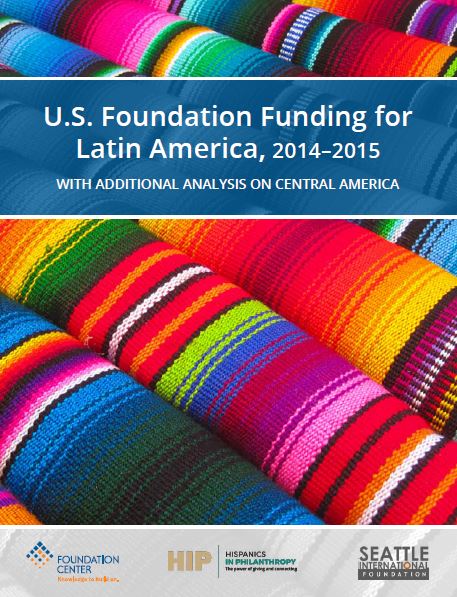A new report, U.S. Foundation Funding for Latin America, 2014–2015, with Additional Analysis on Central America, released today by Foundation Center, Hispanics in Philanthropy, and Seattle International Foundation reveals a 36% increase in funding for Latin America by large U.S. foundations between 2006 and 2015, adjusted for inflation. In 2014 and 2015 alone, 306 large U.S. foundations awarded $1 billion for Latin America. Against the context of ever-changing global relationships, it is increasingly important to understand how funding is channeled to the region to tackle issues like climate change, poverty, and migrant rights.
“This two-year analysis is an update to seven years of collaborative research,” said Lawrence T. McGill, vice president of knowledge services at Foundation Center. “The benefit of multi-year analysis like this is that it helps civil society leaders identify long-term trends, so they can better target their resources and collaborate effectively to meet the most pressing needs in the region.”
“The number of funders to Central America has been on an upward trend since 2006. However, the majority of funding has gone to organizations based outside of the region, a practice that undercuts the ability of local actors to offer more efficient, appropriate, and sustainable solutions. The ongoing challenges in Central America, especially the Northern Triangle and Nicaragua, call for continued and enhanced engagement by the philanthropic sector,” said Arturo Aguilar, executive director of the Seattle International Foundation.
Key findings from this analysis include:
· The top 20 funders provided 81% of funding for Latin America. At the top of the list is Bill & Melinda Gates Foundation who awarded $262 million for the region in 2014 and 2015 alone.
· Mexico benefited from the largest share of grantmaking by U.S. foundations, accounting for 36% of all grant dollars for Latin America in 2014 and 2015.
· Women and girls received 13% of total funding for the region while children and youth were the focus of 12% of grants and 8% was dedicated for indigenous peoples.
· Just 6% of all international grant dollars from large U.S. foundations went toward Latin America; under 1% was directed toward Central America. The rest was awarded largely to other regions such as Western Europe and Sub-Saharan Africa.
· In 2014 and 2015, the majority of funding for Central America, 89%, was awarded to organizations located outside the region. While there has been an increase in the number of funders supporting the region over the last 10 years, overall funding has remained relatively flat.
This report will be featured this month at the 2018 Central America Donors Forum in El Salvador, an initiative of Seattle International Foundation, where key findings and trends will be shared with over 300 leaders in international philanthropy. “We are happy to see more philanthropic organizations providing increased investments to the region and challenging the nonprofit sector to innovate,” noted Ana Marie Argilagos, president of Hispanics in Philanthropy. “This report will contribute to strengthening the philanthropic sector’s focus in Latin America and provide a better understanding of how philanthropy can best support the work on the ground, while developing nonprofit leadership across Latin America.” Download U.S. Foundation Funding for Latin America, 2014–2015, with Additional Analysis on Central America in English or Spanish on IssueLab.
About Foundation Center
Established in 1956, Foundation Center is the leading source of information about philanthropy worldwide. Through data, analysis, and training, it connects people who want to change the world to the resources they need to succeed. Foundation Center maintains the most comprehensive database on U.S. and, increasingly, global grantmakers and their grants — a robust, accessible knowledge bank for the sector. It also operates research, education, and training programs designed to advance knowledge of philanthropy at every level. Thousands of people visit Foundation Center’s website each day and are served in its five regional library/learning centers and its network of more than 450 funding information centers located in public libraries, community foundations, and educational institutions nationwide and around the world. For more information, please visit foundationcenter.org, call (212) 620-4230, or tweet us at @fdncenter.
About Hispanics in Philanthropy
Hispanics in Philanthropy (HIP) works nationally and globally to strengthen Latino equity, leadership, and voice. Over our 35-year history, HIP has invested more than $50 million in Latino-led, Latino-serving nonprofits across the Americas. We partner with foundations, corporations, and individuals to bring increased resources to Latino-focused work in health, education, civic engagement, gender, and more. Recent accomplishments include launching HIPGive.org, the first bilingual, bicultural crowdfunding platform focused on Latino communities. Since its launch in 2014, $2 million has been raised and distributed for local projects in the U.S. and Latin America. Additionally, HIP provides leadership training and professional development to Latinos working in the social sector through its Next Generation Latino Líderes program, which launched in 2015. For more information, please visit hiponline.org.
About Seattle International Foundation
Seattle International Foundation (SIF) champions equity and rule of law in Central America through good governance and a robust civil society. SIF works with other donors to the region to increase philanthropy and to promote collaboration, learning, and coordination of efforts to address inequality in Central America. SIF was founded in 2008 as a supporting organization to Seattle Foundation for the purpose of increasing and enhancing philanthropy and development from the Pacific Northwest. Since 2008, SIF has granted more than $20 million to 243 organizations in 81 countries, including $12 million in grants to Central America. For more information, visit seaif.org. To learn more about the Central America Donors Forum, visit cadonorsforum.org.




